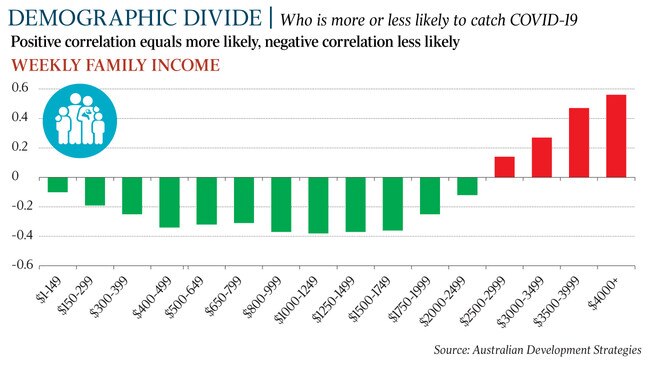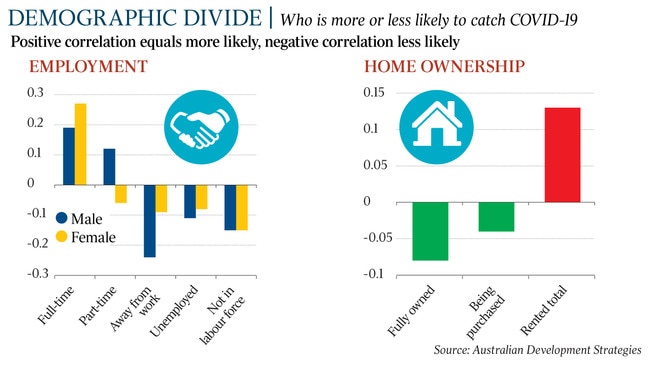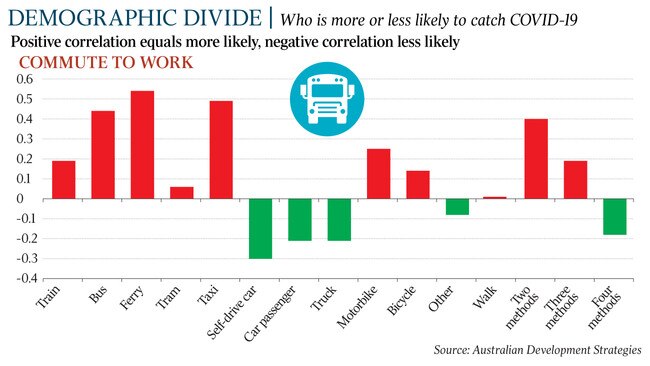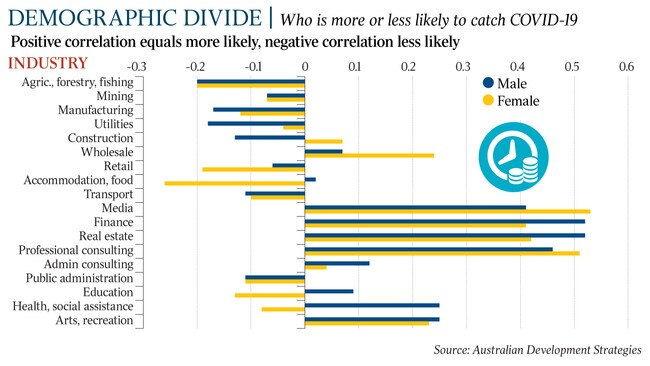Coronavirus Australia: Wealthy cop a health hit as the poor pay with their jobs
Latest COVID-19 data shows affluent Australians are taking a health hit while the poor are paying with their jobs.

At this stage of the COVID-19 pandemic, it’s not a good time to be rich. Our initial profile of Sunday morning’s publicly available data on positive tests per capita reveals it’s the haves who also have COVID-19.
We’re talking about families earning at least $150,000 a year, and as the family income passes $200,000, per capita COVID-19 numbers really surge.
The high-risk group is professional couples living in urban areas, with two jobs spread across industries such as media, finance, real estate and professional consulting. Their children tend to be sent to independent and Catholic higher-fee schools.
We’re not seeing signs of teachers or women working in healthcare being affected as yet, but men working in healthcare show signs of being hit at this early stage.
Our high-income professional couples already spend a lot on visits to their GP, optometrist and chiropractor. Unfortunately, they also seem to spend a lot on overseas travel, especially cruise ships.

As some state governments begin to trickle out COVID-19 data by local government area, it’s finally possible to construct a stereotype of demographics dominating those neighbourhoods with the most positive tests and make some crude projections on to the broader national canvas.
This picture will evolve, as the government spreads the testing net wider, to include more healthcare workers and greater numbers of asymptomatic cases.
Meanwhile, it’s useful for health workers and government — and also the poor punters losing their jobs or, worse still, their lives — to understand what’s happening behind the curtain drawn by politicians at their never-ending news conferences.
The data profiles show that haves with confirmed COVID-19 are joined by neighbourhoods dominated by returning migrants from countries now being devastated by the virus or who may be soon hit even harder: South Africa, France, the US, Canada, Ireland and Britain.
Interestingly enough, there’s no sign of Chinese-born in this table and as far as country of birth is concerned, it’s really, really good to be able to call Australia home.
While migrants cluster in more vulnerable built-up urban areas, Australian-born residents are much more likely to be found in rural areas that are proving much safer places to live in at the moment.
Our classic “goat-cheese circle” stereotype provides the sharpest generalised description of the high-risk urban group.
We’ve reproduced a relevant map by federal electorate on our Australian Development Strategies site. This map draws clear boundaries around wealthier suburbs above a northwesterly line through the centre of Sydney, including all of Canberra, and a northeasterly axis of suburbs in Melbourne, west Brisbane, southeast Adelaide and central Perth.

There’s one more stereotype worth examining: our “coming of age” stereotype. This includes the 20-somethings in the stage of completing studies and moving out of home. They’re restless and highly mobile, with few established religious beliefs.
These age groups are dominating positive tests for COVID-19 but tend to regard themselves as immune. Video evidence from Australian beaches and pubs recently shows them taking the most risks with their lives and the lives of others.
We find this group living in the same suburbs as their parents, often in the family home, but also in adjoining cheaper digs, closer to universities and the CBD nightlife.
We see more provincial cities in this group, such as Newcastle and Wollongong.
We’re also seeing fainter signs of older 30-somethings also testing positive to COVID-19 in this first wave and tragically, older and more vulnerable Australians in their 80s and 90s, for whom this virus is often deadly.
Our stereotypes that have been relatively unscathed so far include “working families” and the “digitally disrupted”.
Our working families comprise a blue-collar dad and white-collar mum in their late 30s and early 40s, with a couple of kids.
This group comprises about one in four families and is found across mid to outer suburbs and in provincial cities.

Our slightly smaller digitally disrupted stereotype comprises semi-skilled and unskilled blue-collar workers and their families.
Because of their lower incomes, we find these families living on the fringes of major cities or in provincial cities or in more rural areas, wherever house-and-land packages are more affordable. Because of their size and strategic location, these two stereotypes tend to make or break governments.
They made Kevin Rudd Labor prime minister in 2007 and they made Scott Morrison Liberal prime minister last year.
Fortunately for them, they don’t have a lot of spare cash for overseas travel and staying close to home is a more readily affordable lifestyle.
They have so far escaped the major health impacts of COVID-19, but have been devastated by its economic impact.
These are the “quiet Australians” hoping the Prime Minister protects their jobs, as well as their health.
The goat-cheese circle stereotype on the other hand has experienced the worst of COVID-19 but — through their professional jobs and higher incomes — are more economically insulated from the virus. They dominate the groups calling for harder and more urgent action to lock down the virus.
They are also the demographic that dominates Liberal urban electorates and they very nearly tipped Morrison out of office last year. They certainly accounted for Tony Abbott in Warringah and Georgina Downer in Mayo.
Politically, they tend to be an unforgiving lot.
So, it’s quite a tightrope Morrison is trying to walk here — and he’s got a long walk ahead of him.
John Black pioneered election profiling in Australia in the 1970s and is a former Labor senator for Queensland. He is executive chairman of Australian Development Strategies.
Jeanine McMullan is a Brisbane family doctor and chief executive of Health Geographics



To join the conversation, please log in. Don't have an account? Register
Join the conversation, you are commenting as Logout